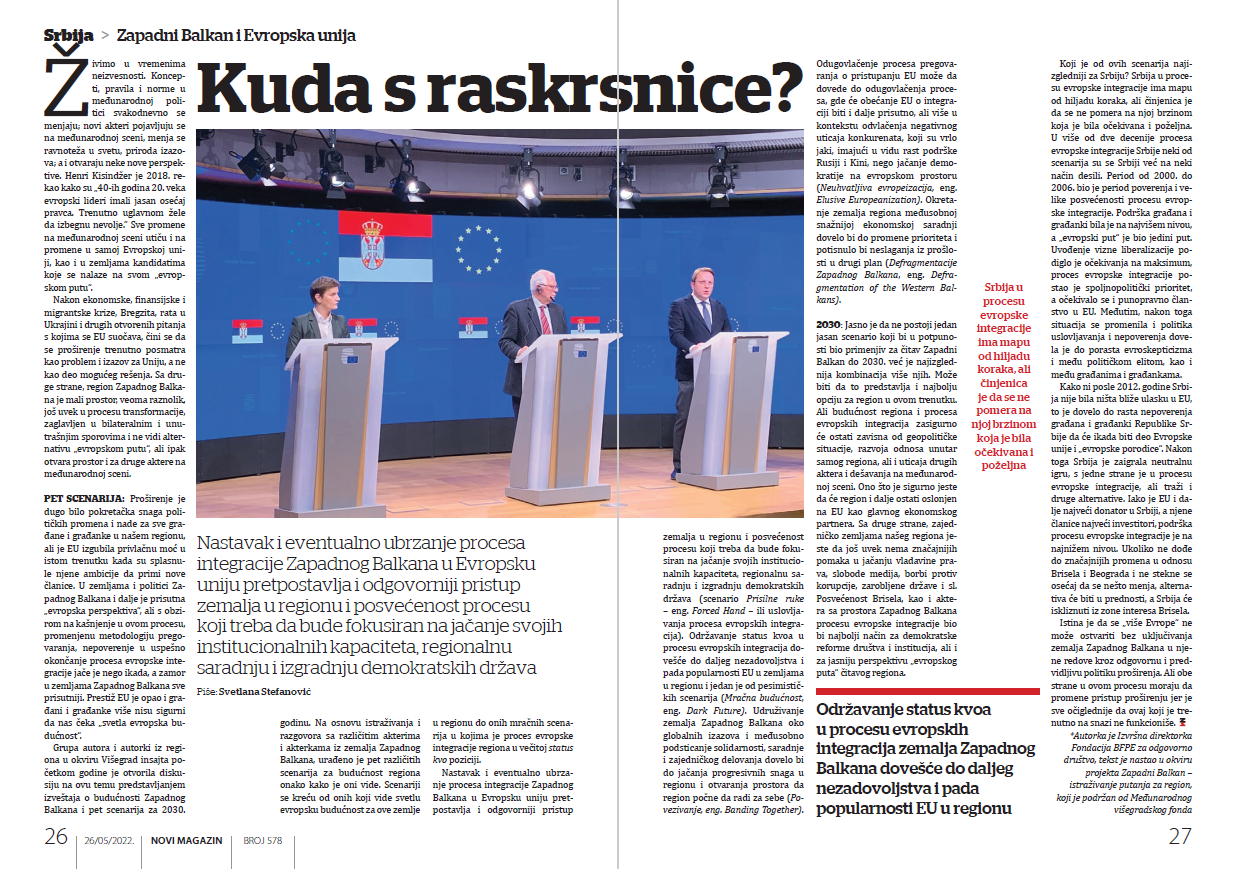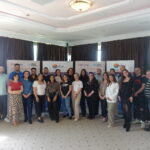The author of the text is Executive Director of Foundation BFPE for Responsible Society, Svetlana Stefanović. The text was originally published in the 578th issue of Novi magazin.
We live in times of uncertainty. Concepts, rules and norms in international politics are changing on a daily basis; new actors are appearing on the international stage, the balance in the world is changing, and so is the nature of the challenge; some new perspectives are being created. In 2018, Henry Kissinger said that in the 1940s, European leaders had a clear sense of direction. At the moment, they mostly want to avoid trouble. ” All the changes on the international scene affect the changes in the European Union itself, as well as in the candidate countries that are on their “European path”.
After the economic, financial and migrant crisis, Brexit, the war in Ukraine and other unresolved issues facing the EU, enlargement seems to be currently seen as a problem and challenge for the Union, not as part of a possible solution. On the other hand, the Western Balkans are a small space, very diverse, still in the process of transformation, stuck in bilateral and internal disputes, that sees no alternative to the “European path”, but still opens space for other actors on the international stage.
FIVE SCENARIOS: Enlargement has long been a driving force for political change and hope for all citizens in our region, but the EU lost its appeal at a time when its ambitions to accept new members have waned. The “European perspective” is still present in the countries and politics of the Western Balkans, but given the delays in this process, the changed negotiation methodology, distrust in the successful completion of the European integration process is stronger than ever, and fatigue in the Western Balkans is growing. The prestige of the EU has decreased and the citizens are no longer sure that a “bright European future” awaits us.
At the beginning of the year, a group of authors from the region, within Visegrad Insight, opened a discussion on this topic by presenting a report on the future of the Western Balkans and five scenarios for 2030. Based on research and interviews with various actors from the Western Balkans, five different scenarios have been developed for the future of the region as they see it. The scenarios range from those who see a bright European future for these countries in the region, to those dark scenarios in which the process of European integration of the region is in an eternal status quo position.
Continuation and eventual acceleration of the process of European integration of the Western Balkans into the European Union presupposes a more responsible approach of the countries in the region and commitment to the process which should be focused on strengthening its institutional capacities, regional cooperation and building democratic states (Forced Hand). Maintaining the status quo in the process of European integration will lead to further dissatisfaction and decline in the popularity of the EU in the countries in the region and is one of the pessimistic scenarios (Dark Future). Bringing together the countries of the Western Balkans on global challenges and mutually encouraging solidarity, cooperation and joint action would strengthen the progressive forces in the region and open the space for the region to start working for itself (Banding Together). Obstructions in the EU accession negotiations may result in delays in the process, with the EU’s promise of integration remaining, but more in the context of diverting negative influence from rivals, who are becoming increasingly powerful due to growing support for Russia and China, rather than strengthening democracy within Europe. (Elusive Europeanization). Turning the countries of the region towards stronger economic cooperation would lead to a change in priorities and would push disagreements from the past into the background (Defragmentation of the Western Balkans).
2030: It is clear that there is no universal scenario that would be fully applicable to the entire Western Balkans by 2030 and the most likely outcome is a combination of multiple scenarios. It may even be the best option for the region at the moment. But the future of the region and the process of European integration will certainly remain dependent on the geopolitical situation, the development of relations within the region, but also the influence of other actors and events on the international scene. What is certain is that the region will remain dependent on the EU, as its main economic partner. On the other hand, what the countries of our region have in common is that there is still no significant progress in strengthening the rule of law, freedom of media, the fight against corruption, liberating the captured state and the like. The commitment of Brussels, as well as the actors from the Western Balkans, to the process of European integration would still be the best way for democratic reforms of society and institutions, but also for a clearer perspective of the “European path” of the entire region.
Which of these scenarios is the most likely for Serbia? In the process of European integration, Serbia still has a map of a thousand steps, but the fact is that it is not moving at the speed that was expected and desirable. In more than two decades of Serbia’s European integration process, some of the scenarios have already happened to Serbia in some way. The period from 2000 to 2006 was a period of trust and great commitment to the process of European integration. The support of the citizens was at the highest level, and the “European path” was indeed the only path. The introduction of visa liberalization has raised expectations to the maximum, the process of European integration has become a foreign policy priority, and full membership in the EU was expected. However, after that, the situation changed and the policy of conditioning and distrust led to an increase in Euroscepticism among the political elite, as well as among citizens. As even after 2012, Serbia was no closer to joining the EU, that led to the growing distrust of the citizens of the Republic of Serbia that they will ever be part of the European Union and the “European family”. After that, Serbia played a neutral game, as on the one hand it is in the process of European integration, but on the other hand, it is looking for other alternatives. Although the EU is still the largest donor in Serbia, and its members are the largest investors, support for the European integration process is at the lowest level. If there are no significant changes in the relationship between Brussels and Belgrade, and there is no feeling that something is changing, alternatives will be in the lead, and Serbia will slip out of the zone of interest of Brussels.
It is true that “more Europe” cannot be achieved without the inclusion of the Western Balkan countries in its ranks through a responsible and predictable enlargement policy. But both sides in this process need to change their approach to enlargement, as it is becoming increasingly clear that the one currently in force is not working.
*The text was created within the project Western Balkans – research of routes for the region, which is supported by the International Visegrad Fund.













